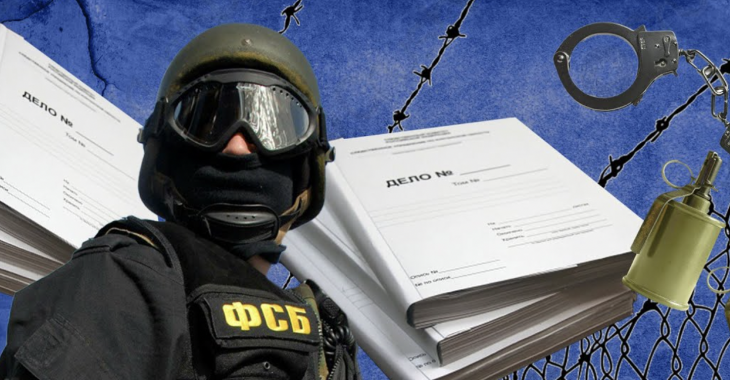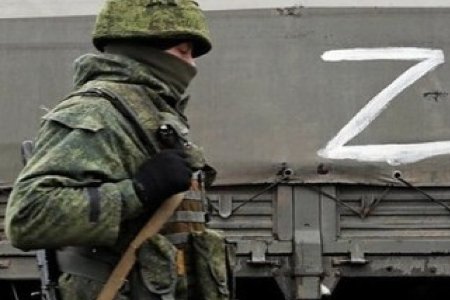
‘Treason’ charges have reportedly been laid against Lera Dzhemilova eight months after the young woman, then 28, was taken from her home by Russian FSB officers and effectively disappeared. There has still been no official acknowledgement that Lera is in custody, with the FSB earlier denying that any criminal charges had been laid.
It was only at the beginning of February 2025 that news emerged of this effective abduction after Lera’s mother approached Irade, a local human rights group. Lenora Dzhemilova explained that her daughter had been taken away by the FSB on 21 May 2024. The officers had carried out a search of her home, taking away all telephones, a laptop, camera and memory drives.
Initially Leonora was informed that an occupation ‘magistrate’s court’ had handed down an administrative ruling, jailing Lera Dzhemilova for 15 days. This was, purportedly for refusing a drugs test. Later, however, the FSB told Lera’s sister that they need not come to pick her up from the holding unit as she would be taken from there to the FSB.
From then on, the family were told nothing about Lera’s whereabouts, and what, if any, legal status she had. Quite the contrary, in fact, with the FSB telling Leonora that no criminal proceedings had been brought against her daughter and that no criminal investigation was underway. The occupation ‘prosecutor’s office, did, however refuse to investigate the family’s report of Lera’s abduction, claiming that this was because they could not divulge ‘a state secret’.
It has become standard for Russia’s FSB to carry out such effective abductions, with their victims held incommunicado and, usually, without any legal status. The FSB typically use such periods, where a person is completely defenceless, to apply torture and other illegal forms of duress to force out ‘confessions’ to this or that purported crime. There have been many cases where the victim was forced to provide several different ‘videoed confessions’ and / or to learn one off by heart, with any hesitation or deviation likely to be ‘punished’. Worth noting also that at least two Ukrainian political prisoners (Oleksiy Stohniy, Vladyslav Yesypenko) were shown on such videos ‘confessing’ to things that were later omitted in the charges against them.
Citing its own sources, the Crimean Human Rights Group has reported that Lera Dzhemilova is imprisoned in SIZO No. 2, a remand prison opened soon after Russia’s full-scale invasion of Ukraine and believed to be under the control of the FSB. The charge of ‘state treason’ now brought against the young woman is under Article 275 of Russia’s criminal code.
As reported, there has been a massive increase in Russia’s use of ‘treason’ and ‘spying’ charges since its full-scale invasion of Ukraine. ‘Spying’ charges, under Article 276) have become a favourite against those civilian hostages abducted by the Russian invaders as early as March 2022, with the charges sometimes laid two years or more after the person was abducted.
There is near total secrecy about such cases, with the ‘trials’ taking place behind closed doors. What does, however, seem clear from the scant details that are available is that such ‘treason’ or ‘spying’ charges often differ only with respect to whether a person has Russian citizenship or not. Since Russia has made it impossible to receive healthcare, to keep ones property, to work etc. on occupied territory without taking a Russian passport, the fact that this citizenship is then used as excuse for ‘treason’ charges seems especially cynical. There have also been a number of cases where the FSB have brought charges of ‘treason’ over a donation to Ukraine’s Armed Forces or similar.
Whatever the pretext for Russia’s persecution of Lera Dzhemilova, it is clear that the charges were brought long after the young woman, who turned 29 on 29 November 2024, had been illegally held prisoner, denied contact with her family and, almost certainly, access to an independent lawyer.
‘Treason’ charges have reportedly been laid against Lera Dzhemilova eight months after the young woman, then 28, was taken from her home by Russian FSB officers and effectively disappeared. There has still been no official acknowledgement that Lera is in custody, with the FSB earlier denying that any criminal charges had been laid.
It was only at the beginning of February 2025 that news emerged of this effective abduction after Lera’s mother approached Irade, a local human rights group. Lenora Dzhemilova explained that her daughter had been taken away by the FSB on 21 May 2024. The officers had carried out a search of her home, taking away all telephones, a laptop, camera and memory drives.
Initially Leonora was informed that an occupation ‘magistrate’s court’ had handed down an administrative ruling, jailing Lera Dzhemilova for 15 days. This was, purportedly for refusing a drugs test. Later, however, the FSB told Lera’s sister that they need not come to pick her up from the holding unit as she would be taken from there to the FSB.
From then on, the family were told nothing about Lera’s whereabouts, and what, if any, legal status she had. Quite the contrary, in fact, with the FSB telling Leonora that no criminal proceedings had been brought against her daughter and that no criminal investigation was underway. The occupation ‘prosecutor’s office, did, however refuse to investigate the family’s report of Lera’s abduction, claiming that this was because they could not divulge ‘a state secret’.
It has become standard for Russia’s FSB to carry out such effective abductions, with their victims held incommunicado and, usually, without any legal status. The FSB typically use such periods, where a person is completely defenceless, to apply torture and other illegal forms of duress to force out ‘confessions’ to this or that purported crime. There have been many cases where the victim was forced to provide several different ‘videoed confessions’ and / or to learn one off by heart, with any hesitation or deviation likely to be ‘punished’. Worth noting also that at least two Ukrainian political prisoners (Oleksiy Stohniy, Vladyslav Yesypenko) were shown on such videos ‘confessing’ to things that were later omitted in the charges against them.
Citing its own sources, the Crimean Human Rights Group has reported that Lera Dzhemilova is imprisoned in SIZO No. 2, a remand prison opened soon after Russia’s full-scale invasion of Ukraine and believed to be under the control of the FSB. The charge of ‘state treason’ now brought against the young woman is under Article 275 of Russia’s criminal code.
As reported, there has been a massive increase in Russia’s use of ‘treason’ and ‘spying’ charges since its full-scale invasion of Ukraine. ‘Spying’ charges, under Article 276) have become a favourite against those civilian hostages abducted by the Russian invaders as early as March 2022, with the charges sometimes laid two years or more after the person was abducted.
There is near total secrecy about such cases, with the ‘trials’ taking place behind closed doors. What does, however, seem clear from the scant details that are available is that such ‘treason’ or ‘spying’ charges often differ only with respect to whether a person has Russian citizenship or not. Since Russia has made it impossible to receive healthcare, to keep ones property, to work etc. on occupied territory without taking a Russian passport, the fact that this citizenship is then used as excuse for ‘treason’ charges seems especially cynical. There have also been a number of cases where the FSB have brought charges of ‘treason’ over a donation to Ukraine’s Armed Forces or similar.
Whatever the pretext for Russia’s persecution of Lera Dzhemilova, it is clear that the charges were brought long after the young woman, who turned 29 on 29 November 2024, had been illegally held prisoner, denied contact with her family and, almost certainly, access to an independent lawyer.



